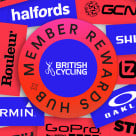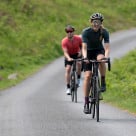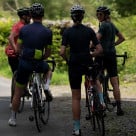Safety Points
If you feel discomfort or pain when being more active you should get advice from a doctor.
Increase your level of activity gradually. This relates to both the amount of time you spend on the activity and the intensity. If you are currently fairly inactive, don't get carried away and rush into it, start off very slowly.
When you are doing any activity, begin slowly for the first few minutes and build up gradually. At the end spend a couple of minutes slowing down gradually. If you are taking part in sport, make sure you warm up and cool down to prevent muscle injury.
Stop exercising if you feel pain or dizziness, or if you feel sick, tired or unwell.
If you have any medical conditions, particularly if you are taking prescribed medication, consult your GP about your chosen activity.
Helmets
British Cycling recommends wearing a correctly fitted helmet while cycling, however we also recognise the right of each individual to choose whether or not to accept this recommendation and the limit to the protection helmets provide. British Cycling’s ultimate aim is to create a safer cycling environment remembering that the safest places in the world to cycle also have the lowest rates of helmet use.
Please note that while taking part in a British Cycling sanctioned race or Sportive, the use of a helmet conforming to a recognised safety standard is mandatory.
Visibility
If riding at night or in poor conditions, we recommend that you wear reflective clothing. Lights conforming to a recognised standard are compulsory if cycling at night.




